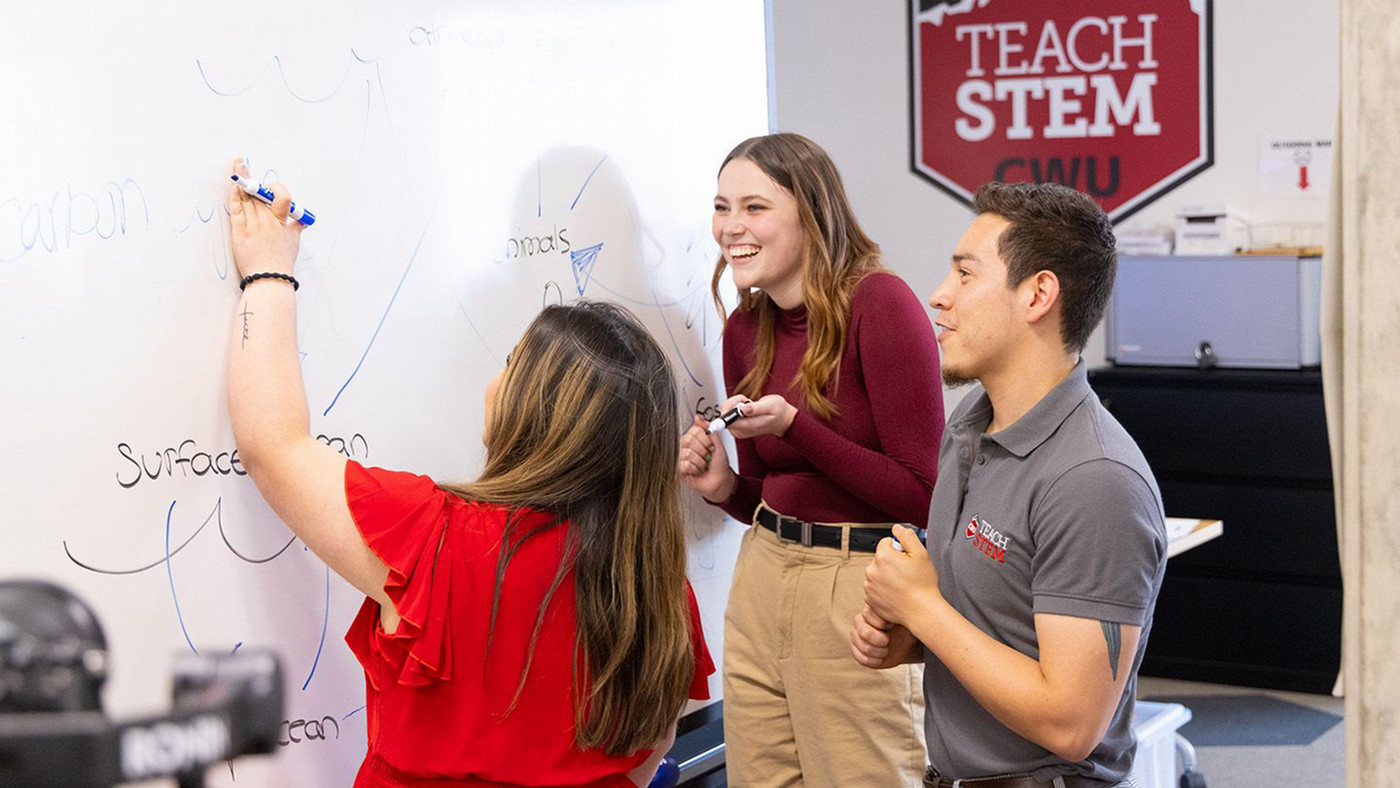
Teach STEM
Graduate Program
CWU is here to help you attain your academic and career goals. The STEM Leadership Specialization offers the unique opportunity to connect, build relationships, gain technical skills, and create a pathway that celebrates your journey toward becoming a leader in your field. To apply, check out our application information.
Why study STEM Leadership at CWU?
- Stand out in your District: CWU proudly offers the only STEM Leadership Master’s program in Washington state. Districts are increasingly interested in hiring and retaining teacher leaders with extensive knowledge of STEM education.
- Enrich your Community: Interface with a growing network of industry partners to collaboratively enhance STEM education in your community and statewide.
- Your Schedule, Your Pace: With a mix of online courses and brief in-person seminars, this program grants you the flexibility to become a STEM leader at a pace that fits your schedule. Courses are offered mid-year and over the summer.
- Integrated, Innovative Curriculum: This novel program empowers teachers to meaningfully integrate multiple STEM disciplines into their own courses via project-based, culturally responsive teaching practices. There are also specialized leadership courses to foster the skills needed to become an effective STEM leader in your community.
Upcoming Opportunities
Cost and Location
For information about tuition and fees, please visit the registrar website.
Location Information: All specialization courses will be hybrid defined as one in-person day at the Ellensburg, WA campus with the remainder of class asynchronously online for the quarter.
Degree Information
-
Overview
Central Washington University is excited to offer a STEM Leadership specialization program as part of the Curriculum and Instruction M.Ed. program. The STEM Leadership program is a 48-credit degree that offers current teachers an opportunity to become STEM leaders in their community. The program offers flexible, mostly on-line programming that allows participants to become part of a connected network of educators, industry partners, and community members interested in preparing the next generation of STEM learners. Coursework emphasizes concepts including authentic assessment, project-based learning, and culturally responsive teaching. Students will also complete a master’s project exploring a topic relevant to their context.
The STEM Leadership Specialization is made up of 48 credits from four different categories of courses.
Note: this program does not lead to a school administration certificate or license.
For additional information about courses and requirements, please visit the current graduate catalog. -
Education Foundation Courses (19 credits))
EDF 507 - Studies and Problems in Intercultural Education (3): Research topics of diversity, equity, and inclusivity. Awareness and analysis of efforts in creating a school climate in multicultural settings.
EDF 510 - Educational Research and Development (4): A study of the types, methodology, and uses in practice of educational research and development skills pertinent to the design and execution of research thesis and education developmental projects.
EDF Electives - See catalog.
EDF 700 – Master's Thesis, Project Study, and/or Examination (6): Designed to credit and record supervised study for the master’s thesis, non-thesis project, studio project, public recital, and/or examination. By permission. May be repeated up to 6 credits. Grade will be either S or U. -
STEM Pedagogy Courses (10 Credits)
STP 501 - Designing Authentic STEM Explorations for Diverse Learners (2): STEM Leaders will engage in and analyze authentic STEM explorations to identify methods for making STEM learning environments engaging and relevant for a diverse group of learners. STEM Leaders will then use STEM best practices to plan and assess authentic STEM explorations that empower a diverse group of learners to explore and create meaningful demonstrations of their learning. By the end of the course, STEM Leaders will design instructional planning and assessment documents for authentic STEM explorations to be used in K-12 STEM classrooms.
STP 502 - Designing and Implementing STEM Problem-Based Instruction (2): STEM Leaders will collaboratively engage in problem-based tasks to understand the underlying instructional philosophy of problem-based learning. STEM Leaders will analyze best teaching practices for using problems authentic to STEM disciplines, facilitating student engagement with these problems so they can connect to their prior knowledge and apply new information through active participation in classroom discourse, and support student learning with authentic, problem-based assessments. By the end of the course, STEM Leaders will plan a problem-based task and develop personal guidelines for improving student discourse and authentic assessments aligned with problem-based learning tasks.
STP 503 - Making STEM Learning Environments that are Culturally Responsive (2): STEM Leaders will integrate culturally responsive teaching practices through a two-phase approach. In the first phase, STEM leaders will unpack their own intercultural development, cultural responsiveness, and world view. In the second phase, STEM leaders will evaluate the culture of their classroom using a research-based framework for culturally responsive teaching. STEM leaders will then apply their gained cultural knowledge, planning appropriate changes to their learning environment design, instructional practices, and assessment practices that better respect and integrate students’ cultures.
STP 504 - Designing and Implementing STEM Project-Based Instruction (2): STEM leaders will collaboratively engage in a project to understand the underlying instructional philosophy of project-based learning. STEM leaders will analyze best teaching practices for using projects authentic to STEM disciplines that help students develop deep content knowledge and critical thinking skills by actively engaging in real-world and personally meaningful projects. By the end of the course, STEM leaders will plan a project with a culminating public product for use in their classroom.
STP 505 - Reflective Teaching to Increase Student Success in STEM (2): STEM leaders will collaboratively engage in reflective teaching practices and examine how these practices impact student learning. STEM leaders will develop a flexible plan for using multiple forms of authentic evidence to improve their learning environment design and teaching practices in ways that respond proactively to the needs of students. By the end of the course, STEM leaders will collect student evidence and develop a plan to use the collected evidence to improve teaching based on student needs.
-
STEM Leadership Course (6credits)
STP 506 – STEM Leadership Through Peer Mentoring and Coaching (3): STEM leaders will study peer mentoring and coaching frameworks, developing the capacity and skills to use the coaching cycle and appropriate strategies to help other teachers become more effective educators. STEM leaders will participate in peer mentoring and coaching within their current educational contexts.
STP 507 – STEM Networking Leadership Seminars (2) x 2: STEM leaders will attend seminars led by STEM partners located throughout Washington State. Through participation in these seminars, STEM leaders will gain opportunities to integrate community-based assets and resources into their current educational context. STEM leaders will learn to leverage community collaborations to support STEM education in their districts, developing relationships that they can use as a resource for designing equitable, innovative projects directly connected to STEM careers.
-
Content Courses (12credits)
In addition to taking the education foundation courses and the STEM teaching and leadership courses, STEM leaders will choose one of the following four STEM content areas: Middle Level Mathematics, Secondary Mathematics, Middle Level Science, and Secondary Science. Each STEM content area consists of one required course and then electives will be chosen from the same STEM area or a similar STEM area with approval of your graduate advisor. The courses within each content area will incorporate research-based best practices through problem- and project-based instruction. They will be taught via an inquiry-driven approach, using innovative technology to guide practicing teachers’ investigations. The following courses will be designed with the targeted purpose of empowering STEM leaders with not only immense content knowledge but also essential problem-solving habits of mind.
MATH 508 – Number Theory: STEM leaders will apply fundamental concepts and algorithms in elementary number theory to solve problems and carefully justify certain results. They will investigate fundamental properties of the integers such as divisibility through multiple lenses, traversing not only traditional algorithms and abstract theorems, but also modern applications and K-12 problems involving everyday phenomena. STEM leaders will also interact with famous unsolved problems in Number Theory and learn to formulate and conceptualize abstract problems in a manner that is accessible to their students.
MATH 509 – Proportional Reasoning and Algebraic Functions: This course will serve to bolster middle-level teachers’ algebraic habits of mind through multifaceted engagement with proportional quantities in real-world contexts. Structural characteristics of additive versus multiplicative models will be explored in the context of authentic problems, and teachers will learn to recognize and apply proportional relationships in other mathematical fields such as geometry and statistics.
MATH 507 – Transformational Geometry: In this course, middle-level teachers will collaboratively solve problems involving fundamental features of various rigid motions in the plane, including translations, rotations, and reflections, as well as similarity transformations such as dilations. Real world phenomena will be studied through the lens of applied transformational geometry and geometric modeling. Throughout the course, teachers will cultivate geometric habits of mind such as conjecturing, generalizing, attending to transformational invariance, and reflecting on the outcomes of geometric manipulations.
MATH 511 – Statistics: Interpreting the World Through Data: Incorporating and generating real-world data from pertinent STEM scenarios, this project-based course will support practicing teachers in constructing, analyzing, and interpreting appropriate statistical models. Teachers will develop statistical habits of mind related to quantifying variability, in service of nurturing future students’ quantitative literacy. STEM leaders will establish themselves as informed statistical thinkers by engaging with authentic problems germane to sampling, bias, statistical inference, and associations between variables.
MATH 512 – Functions and Modeling: This project-based course will grant practicing teachers the opportunity to explore fundamental properties of functions from a mathematical modeling perspective. Teachers will investigate essential function concepts by authentically engaging with the full modeling cycle to model real-world scenarios. In particular, teachers will construct and revise appropriate model assumptions, construct a function model, collaboratively solve posed problems, and assess and refine their mathematical models based on resulting data.
MATH 513 – Calculus for Secondary Teachers: This course will nurture and reinforce practicing secondary teachers’ functional reasoning as they revisit elementary calculus concepts such as limits, continuity, differentiation, and integration. Teachers will hone problem solving habits of mind and employ covariational reasoning with respect to contexts such as rates of change and accumulation of quantities. All mathematical content will be encountered from a problem-solving and exploratory perspective. An overarching goal of the course will be for STEM leaders to investigate and articulate the rich mathematical structure of the real numbers.
MATH 514 – Geometry for the Modern World: In this course, practicing secondary teachers will explore Euclidean and non-Euclidean geometries through the study of various transformations. They will identify and mathematically describe spatial relationships in modern geometric applications. STEM leaders will collaboratively interact with content by creating geometric models of both real-world and theoretical phenomena. This course will also serve to hone teachers’ geometric habits of mind, particularly in the realm of mathematical justification and multimodal reasoning.
SCED 520 – Makerspaces for STEM Teachers: STEM teachers will learn the fundamentals of designing makerspaces for facilitating project-based learning. STEM teachers will design, make, and tinker with makerspaces to facilitate future STEM projects for their classroom.
SCED 530 – Coding for Teachers: STEM teachers will learn how to use computer science core concepts and practices to design coding projects for digital age learners. Experience and knowledge in computer science is not necessary.
SCED 595 – Individual Research Project with CWU Scientist
Careers and Outcomes
If you are ready to take your career to the next level in STEM education, look no further than the STEM Leadership Masters of Education Specialization. This program will prepare you to tackle high impact and relevant topics in your field. With STEM educators in high demand across Washington State, this degree offers you a foundation and opportunity for connection that is tailored to fit your needs.
Upon completing this program, you will be equipped to handle leadership roles in a variety of spaces, including, but not limited to:
- STEM department chair
- STEM District Coordinator
- STEM classroom coach
Teach College in the High School - Math
-
Qualifications
Required:
- BS or BA in Mathematics, Mathematics Education, or a related field
- Master's degree in Mathematics, Mathematics Education, Education, or related field.
Department evaluation will consider the strength of the undergraduate degree, number of graduate mathematics courses, number of years of teaching experience, previous teaching experience with College in the High School, previous teaching experience with Advanced Placement courses, and recognition of teaching excellence via National Board Certification.
A candidate with a master's degree in a field other than mathematics or without prior coursework in statistics can strengthen their application by taking approved graduate courses through the CWU STEM Leadership Program as recommended by the STEM Leadership Director -
Pathways
No Master's?
Complete M.Ed. STEM Leadership program (48cr) with advising for specific classes.
Have a Master's but not math?
Initial acceptance as a CiHS math instructor allows teaching of CWU’s MATH 101, 130, 153, and 154.
Additional Requirements for teaching CiHS Calculus 1/ M A T H 1 7 2 / 1 7 3
- STP 501 (2cr), MATH 512 (3cr), and MATH 513 (3cr)
Aditional Requirements for teaching CiHS Statistics M A T H 211
- STP 501 (2cr), STP 504 (2cr), and MATH 511 (3cr)
Support
This program was made possible by the National Science Foundation, Grant number 1950332. Read the Summary Report (PDF). The opinions, findings, and conclusions or recommendations expressed are those of the author(s) and do not necessarily reflect the views of the National Science Foundation.
Contact Us
Have questions about the MEd STEM Leadership Specialization? Contact us and we'll correspond with you soon!
CWU News

Latest edition of Voyage Magazine available online
April 24, 2024
by University Relations

CWU defensive standout presented with coveted national award
April 24, 2024
by David Leder
Questions? Contact Us.
Teach STEM
Discovery Hall 301